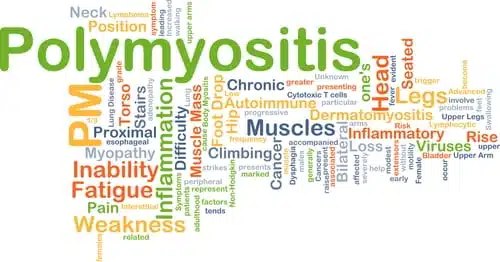
This post discusses disability benefits for Polymyositis. If you are unable to work due to this rare disorder, read on for how the Social Security Administration will evaluate your claim for benefits.
Polymyositis is a muscle disease (similiar to an autoimmune disorder) in which the body attacks it's own muscles. In most cases, the cause of PM is not known and it is also not a genetic disorder.
As the body's immune system cells attack your muscles, the muscles gradually weaken. The muscles most affected are the shoulders, upper arms, hips, thighs and neck (the body movement muscles). Difficulty speaking, swallowing and using the restroom can result. As the condition progresses muscles further away from the body's trunk may be affected (hands, calf and feet).
According to NIH, PM usually occurs in those 31-60 years of age but can happen at any life stage. The disease is also more common among African Americans and women. Blood tests, muscle biopsy, and MRI can be used to diagnose Polymyositis.
Treatments include steroids, like prednisone, that have their own set of possibly disabling side affects. Physical and speech therapy are also treatment options. In addition, intravenous immunoglobulin infusions can be given.
Disability Benefits for Polymyositis
There are three different ways that the SSA can find you disabled based on Polymyositis. You can be found disabled on the listing, by the grids or by being unable to engage in substantial gainful activity based on the combination of your impairments.
Listing 14.05, Polymyositis, requires pelvis or muscle weakness that results in the inability to ambulate effectively or inability to perform fine and gross movements effectively
OR Impaired swallowing (dysphagia) with aspiration due to muscle weakness
OR Impaired respiration due to intercostal and diaphragmatic muscle weakness
OR Diffuse calcinosis with limitation of joint mobility or intestinal motility
OR Repeated manifestations of polymyositis or dermatomyositis, with at least two of the constitutional symptoms or signs (severe fatigue, fever, malaise, or involuntary weight loss) and one of the following at the marked level:
- Limitation of activities of daily living.
- Limitation in maintaining social functioning
- Limitation in completing tasks in a timely manner due to deficiencies in concentration, persistence, or pace.
As with most listings, 14.05 is difficult to meet. If you do not meet this listing, you can also be found disabled based on the Medical-Vocational Guidelines (the grids) if you are over the age of 50. Lastly, since PM can affect different body muscles you may be found disabled if the combinations of your impairment prevent you from engaging in substantial gainful activity.
If you are unable to work, you should apply for Disability Benefits for Polymyositis as soon as possible. Delay may cause you to lose benefits! The Bishop Law Firm represents Social Security Disability clients in Raleigh, Cary, Durham and other areas in North Carolina. Call us today for a free case review, (919) 615-3095.
Also read The Social Security Disability Process

